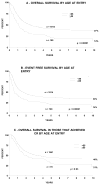Outcomes in older adults with acute lymphoblastic leukaemia (ALL): results from the international MRC UKALL XII/ECOG2993 trial
- PMID: 22409379
- PMCID: PMC4188419
- DOI: 10.1111/j.1365-2141.2012.09095.x
Outcomes in older adults with acute lymphoblastic leukaemia (ALL): results from the international MRC UKALL XII/ECOG2993 trial
Abstract
Although the incidence rate of acute lymphoblastic leukaemia (ALL) is slightly higher in older than in younger adults, response rates to induction chemotherapy and survival rates are poorer. The contribution of disease-related versus treatment-related factors remains unclear. We analysed 100 older patients (aged 55-65 years) treated on the UKALLXII/ECOG2993 trial compared with 1814 younger patients (aged 14-54 years). Baseline characteristics, induction chemotherapy course, infections, drug reductions and survival outcomes were compared. There were more Philadelphia-positive (Ph+) patients in the older group (28% vs. 17%, P = 0·02), and a trend towards higher combined cytogenetic risk score (46% vs. 35%, P = 0·07). The complete remission rate in older patients was worse (73% vs. 93%, P < 0·0001) as was 5-year overall survival (21% vs. 41%, P < 0·0001) and event-free survival (EFS) (19% vs. 37%, P < 0·0001). Older patients had more infections during induction (81% vs. 70%, P = 0·05), and drug reductions (46% vs. 28%, P = 0·0009). Among older patients, Ph+ and cytogenetic risk category as well as infection during induction predicted for worse EFS. Poorer outcomes in these patients are partly due to cytogenetic risk, but there is significant morbidity and mortality during induction chemotherapy with frequent delays and drug reductions. New approaches, including better risk stratification and use of targeted therapies, could improve treatment for these patients.
© 2012 Blackwell Publishing Ltd.
Conflict of interest statement
The authors declare no competing financial interests.
Figures


References
-
- Annino L, Vegna ML, Camera A, et al. Treatment of adult acute lymphoblastic leukemia (ALL): long-term follow-up of the GIMEMA ALL 0288 randomized study. Blood. 2002 Feb 1;99(3):863–71. - PubMed
-
- Appelbaum FR. Impact of age on the biology of acute leukemia. In: Perry MC, editor. American Society of Clinical Oncology Educational Book. 2005. pp. 528–532.
-
- Fielding A, Buck G, Lazarus HM, et al. Imatinib Significantly Enhances Long-Term Outcomes In Philadelphia Positive Acute Lymphoblastic Leukaemia; Final Results of the UKALLXII/ECOG2993 Trial. ASH Abstract. 2010:169.
Publication types
MeSH terms
Grants and funding
LinkOut - more resources
Full Text Sources
Medical

